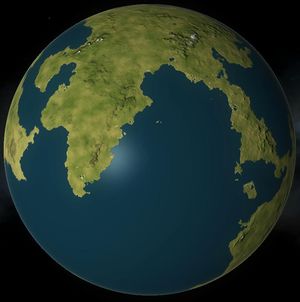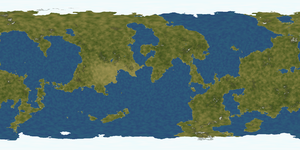Difference between revisions of "Kerbin"
(→Atmosphere) |
m (Apparent gravity) |
||
| Line 14: | Line 14: | ||
*[http://en.wikipedia.org/wiki/Surface_gravity Surface Gravity]: 9.8068 m/s^2 or 1 g | *[http://en.wikipedia.org/wiki/Surface_gravity Surface Gravity]: 9.8068 m/s^2 or 1 g | ||
| + | |||
| + | *Apparent gravity at the launchpad (Gravity minus [http://en.wikipedia.org/wiki/Centrifugal_force Centrifugal acceleration]): 9.7535 m/s^2 | ||
*[http://en.wikipedia.org/wiki/Standard_gravitational_parameter Gravitational parameter]: 3530.461 km^3/s^2 | *[http://en.wikipedia.org/wiki/Standard_gravitational_parameter Gravitational parameter]: 3530.461 km^3/s^2 | ||
Revision as of 06:39, 19 September 2012
Kerbin is the planet where the Space Center is located and the main focus of Kerbal Space Program. It has two moons, named Mun and Minmus. It orbits the M class star Kerbol.
Contents
Characteristics
- Equatorial Radius: 600 km
- Mass: 5.29e22 kg
- Density: 58.467 g/cm^3
- Surface Gravity: 9.8068 m/s^2 or 1 g
- Apparent gravity at the launchpad (Gravity minus Centrifugal acceleration): 9.7535 m/s^2
- Gravitational parameter: 3530.461 km^3/s^2
- Escape velocity from surface: 3430.45 m/s
- Sidereal Rotation Period: 6 hours; Rotation: 60 degrees per hour, or 174.5 m/s at the equator
- Solar Day: 6.0142 hours, or 6 hours, 51 seconds.
- Kerbosynchronous Orbit altitude: 2868.4 km; Kerbostationary Orbit velocity: 1008.9 m/s
Orbital Characteristics
- Semi-Major Axis: 13,599,840,256m or 0.0909092385 Astronomical Units (A.U.)
- Velocity: 9284.5 m/s
- Mean Anomaly at Epoch UT = 0.0: 3.140000 radians
- Orbital Period: 2,543 hours, or 106 Earth days
- Sphere of influence: ~ 84,275 km or 140 body radii
Topography
Kerbin has a roughly equal distribution of liquid water and solid land, with polar icecaps and scattered deserts. Between versions 0.7 and 0.14.1 (Including the current demo version of 0.13.3), some mountain ranges exceeded 600 m in height. The highest point was at approximately 900 m altitude.[1] In registered versions 0.14.2 and later, a new terrain engine has resulted in mountains exceeding 3 km high. The tallest mountain at least 3750 m.[[2]]
Atmosphere
Kerbin has an atmosphere of unknown composition, though because Kerbin has plants and animals, it can be assumed there is O2, N2, and CO2. The atmosphere gets exponentially less dense as altitude increases (5 km scale height), and ends at 69,077.55 meters. [3][4]
Pressure == exp(-alt(m)/5000) [units needed] Density == 1.2223*exp(-alt(m)/5000) [units needed]
As of 0.15.2, atmospheric temperature varies with altitude in a roughly Earth-like manner.[5]
Natural Satellites
As of 0.13.3, Kerbin had a single moon, The Mün. With 0.15, Kerbin has a second satellite, Minmus.
Reference Frames
| Paid (0.15.2) | Demo (0.13.3) | |
|---|---|---|
| Rotational/Inertial transition | 100,000 m | 70,000 m |
| Warp | Minimum Altitude | |
| 1x | n/a | |
| 2x | 0 m | |
| 5x | 69,078 m (above the atmosphere) | |
| 10x | 69,078 m (above the atmosphere) | |
| 50x | 120,000 m | 150,000 m |
| 100x | 240,000 m | 300,000 m |
| 1,000x | 480,000 m | 600,000 m |
| 10,000x | 600,000 m | 1,200,000 m |

